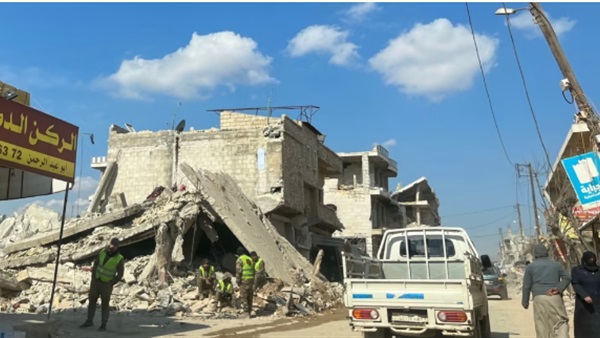"Abandoned and Left to Fend for Themselves: Syrians Struggle for Aid in Wake of Devastating Earthquake"

Syrians in rebel-held territory are struggling to recover
from a devastating earthquake that hit the area on February 6, as international
aid has yet to arrive. The earthquake claimed 2,274 lives, and many survivors
are living in the rubble-filled streets with no shelter or access to aid. Ali
al-Eid, a resident of Jinderes, was one of the many victims left to fend for
himself after the earthquake, sleeping in a tent that cost him $150 after he
accused a local of hoarding supplies. Aid deliveries to areas outside of the
regime's control have been heavily politicized since the start of the war, with
the UN rarely expressing its discontent.
The international community immediately responded to the
earthquake by sending hundreds of millions of dollars in supplies and
specialist rescue teams to disaster-hit southern Turkey, located just an hour's
drive north of Jinderes. However, almost a week after the earthquake, no
international aid had arrived, leaving the victims to fend for themselves as
they have gotten used to doing throughout 12 years of civil war. The last
remnants of the armed opposition are holding on in northern enclaves, some
under the protection of Turkey. About 2 million people live in enclaves under
Turkish control that rely heavily on support from Ankara, including those
living around Jinderes, and the majority depend on foreign aid to survive.
Aid deliveries have been heavily restricted by Assad and his
ally Russia on the UN Security Council, which together have gradually
restricted aid flows. The UN, which operates in both regime- and opposition-controlled
areas, has rarely expressed its discontent, which critics say helps it maintain
access to regime-held areas at the expense of desperate residents of the
north-west. The UN has also faced criticism for pre-planning most of the aid
sent since the earthquake, which did not include emergency relief or rescue
equipment.
Local charities and Turkish disaster relief agencies have
sent relief, and trucks from Iraq's Kurdistan region, Saudi Arabia, and Qatar
have also begun to arrive. However, the earthquake has left locals in a state
of desperation and chaos, and many fear that they will not receive the aid they
need without international groups coming in to distribute it.
The earthquake has hit a region already struggling with
instability, with dozens of factions competing for resources and young men
running around with guns they barely know how to hold. Fighters who escorted a
Financial Times team around Jinderes expressed resentment at being occupied by
foreigners despite the salaries they receive from Ankara, worth $50 a month.
The Turkish presence is felt heavily at every turn, but locals still complain
of instability.







